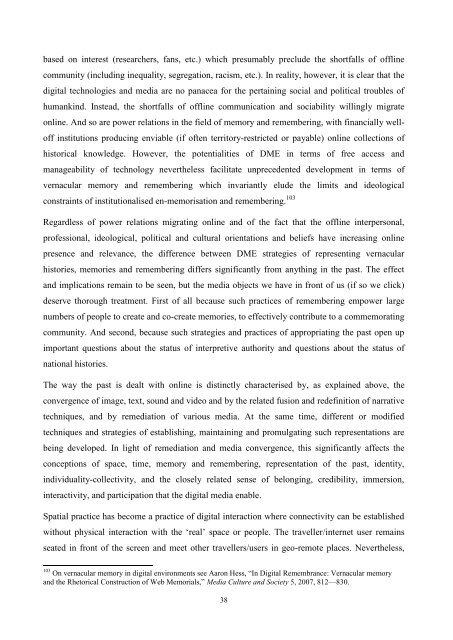UNIVERSITY OF NOVA GORICA GRADUATE SCHOOL ...
UNIVERSITY OF NOVA GORICA GRADUATE SCHOOL ...
UNIVERSITY OF NOVA GORICA GRADUATE SCHOOL ...
Create successful ePaper yourself
Turn your PDF publications into a flip-book with our unique Google optimized e-Paper software.
ased on interest (researchers, fans, etc.) which presumably preclude the shortfalls of offline<br />
community (including inequality, segregation, racism, etc.). In reality, however, it is clear that the<br />
digital technologies and media are no panacea for the pertaining social and political troubles of<br />
humankind. Instead, the shortfalls of offline communication and sociability willingly migrate<br />
online. And so are power relations in the field of memory and remembering, with financially welloff<br />
institutions producing enviable (if often territory-restricted or payable) online collections of<br />
historical knowledge. However, the potentialities of DME in terms of free access and<br />
manageability of technology nevertheless facilitate unprecedented development in terms of<br />
vernacular memory and remembering which invariantly elude the limits and ideological<br />
constraints of institutionalised en-memorisation and remembering. 103<br />
Regardless of power relations migrating online and of the fact that the offline interpersonal,<br />
professional, ideological, political and cultural orientations and beliefs have increasing online<br />
presence and relevance, the difference between DME strategies of representing vernacular<br />
histories, memories and remembering differs significantly from anything in the past. The effect<br />
and implications remain to be seen, but the media objects we have in front of us (if so we click)<br />
deserve thorough treatment. First of all because such practices of remembering empower large<br />
numbers of people to create and co-create memories, to effectively contribute to a commemorating<br />
community. And second, because such strategies and practices of appropriating the past open up<br />
important questions about the status of interpretive authority and questions about the status of<br />
national histories.<br />
The way the past is dealt with online is distinctly characterised by, as explained above, the<br />
convergence of image, text, sound and video and by the related fusion and redefinition of narrative<br />
techniques, and by remediation of various media. At the same time, different or modified<br />
techniques and strategies of establishing, maintaining and promulgating such representations are<br />
being developed. In light of remediation and media convergence, this significantly affects the<br />
conceptions of space, time, memory and remembering, representation of the past, identity,<br />
individuality-collectivity, and the closely related sense of belonging, credibility, immersion,<br />
interactivity, and participation that the digital media enable.<br />
Spatial practice has become a practice of digital interaction where connectivity can be established<br />
without physical interaction with the ‗real‘ space or people. The traveller/internet user remains<br />
seated in front of the screen and meet other travellers/users in geo-remote places. Nevertheless,<br />
103 On vernacular memory in digital environments see Aaron Hess, ―In Digital Remembrance: Vernacular memory<br />
and the Rhetorical Construction of Web Memorials,‖ Media Culture and Society 5, 2007, 812—830.<br />
38

















